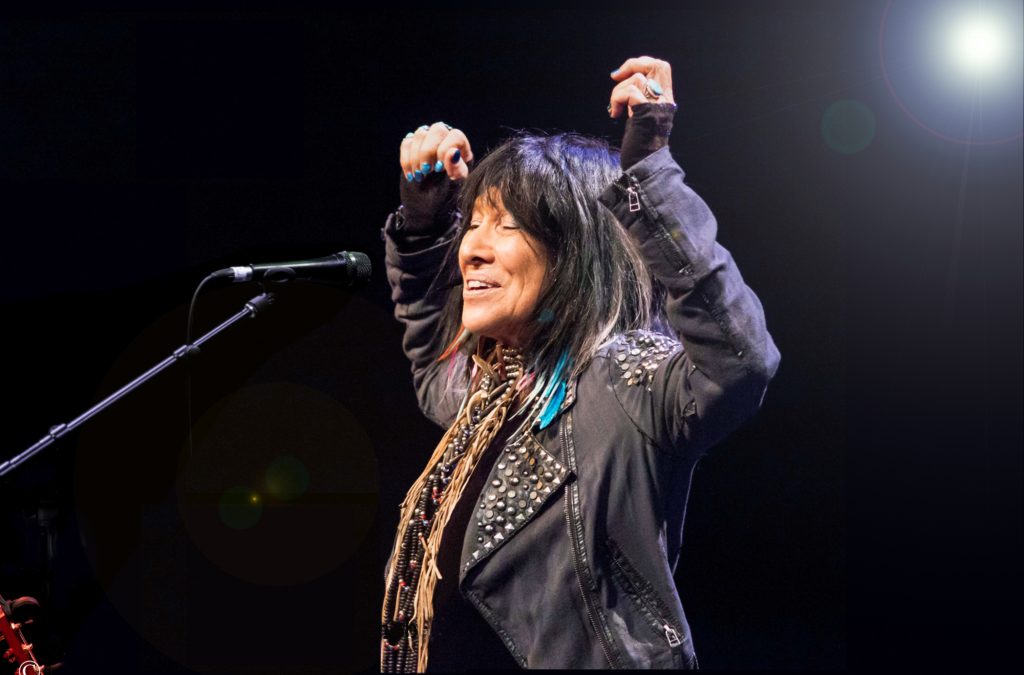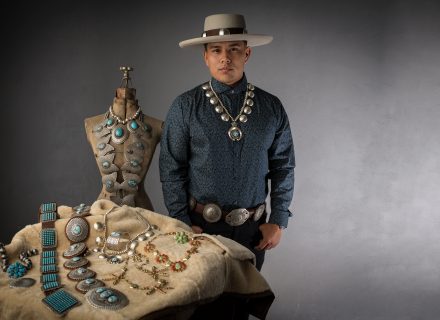After decades of mainstream popularity, award-winning singer-songwriter and Indigenous advocate Buffy Sainte-Marie is still crushing it.
Ever since Buffy Sainte-Marie’s groundbreaking 1964 debut album, It’s My Way!, the Cree singer-songwriter has been a musical trailblazer, innovative artist, and lifelong advocate of Indigenous peoples. Self-taught on the piano and guitar, Sainte-Marie was a voice for the 1960s and early ’70s with her anti-war anthem “Universal Soldier.” She’s been blacklisted and silenced, all the while writing pop standards sung and recorded by the likes of Janis Joplin, Elvis Presley, Donovan, and Joe Cocker.
From coffeehouses in Toronto’s old Yorkville district to New York City’s Greenwich Village as part of the ’60s folk scene, Sainte-Marie made her mark alongside other emerging Canadian contemporaries such as Leonard Cohen, Neil Young, and Joni Mitchell, who has often mentioned her as an early influence.
Over a 55-year span, she has released 18 original albums (plus a two-volume best-of compilation and a collection of previously unreleased material), boasting such classic songs as “Until It’s Time for You to Go” and the Oscar-winning “Up Where We Belong” from the movie An Officer and a Gentleman. In 1976, she took a 16-year hiatus from recording to raise her son, Dakota Starblanket Wolfchild, and to work on the children’s television series Sesame Street.
Born on a Cree reservation in Saskatchewan, she was orphaned as a baby and later adopted and raised in Massachusetts by a part-Mi’kmaq Native American family named Sainte-Marie.
Growing up, Sainte-Marie knew little about her Cree background, but the eventual discovery of her heritage inspired her creativity, and she began to write and perform protest and love songs as a college student in the early 1960s. Her social activism continued to blossom, and in 1969 she founded the Nihewan Foundation for Native American Education. She has worked on behalf of Indigenous peoples ever since.
Now a youthful 78, Sainte-Marie remains vital and relevant, with two albums in the last four years, touring, and the 2018 release of Buffy Sainte-Marie: The Authorized Biography with a foreword by Joni Mitchell.
Cowboys & Indians had the opportunity to engage Sainte-Marie in a leisurely hour-long conversation about her creative life and what still keeps her productive and in the zone.
Cowboys & Indians: You have had a wonderfully busy several years with the release of two albums, Medicine Songs and Power in the Blood. What keeps you so prolific and current?
Buffy Sainte-Marie: I’m alive, I pay attention, and I care. When I think that I can help in any way, I give it a shot! Whether traveling to perform or staying at home to write songs and music, I find the world is fascinating and challenging and full of misinformation, and through my music I try to put a little spotlight on hidden alternatives that don’t make anyone a profit so gets overlooked. That’s where Indigenous thinking comes in. I live on a farm, so I don’t take the bulls--t of the world personally; I just use what I can as fertilizer to grow new music and let the rest go in one ear and out the other. I write songs and do other creative things because I’m interested in the world around me and love songwriting.
What I’m saying is I love what I do and it comes very easy to me. I only write when I feel like it and become interested in the story that the song is telling.
C&I: You’ve been prolific for more than 50 years, releasing 22 albums during your career, including Power in the Blood when you were 74 and winning Canada’s Polaris Music Prize. Tell us a bit about Aboriginal music.
Sainte-Marie: Like everybody else in the world, Indigenous people create music. You hear almost none in mainstream United States, but in Canada it’s way different. There are so many Aboriginal Canadians in music — artists, producers, musicians, songwriters, and, most important, sales. We have our own Juno Awards category. You can hear us on the radio; you can find us on Spotify, iTunes, and the other usual music outlets. We also have lots of web presence and perform at huge powwows.
I do symphony concerts with my band, too, and [in 2018 we did] a series of concerts playing with the Regina Symphony Orchestra, bringing the RSO to three neighboring reserves, including my own, Piapot [Regina, Saskatchewan].
C&I: Then came Medicine Songs with some pretty powerful social messages, especially “The War Racket.” What fuels your social consciousness?
Sainte-Marie: Writing about something you feel intensely strong about regenerates its own energy. I have seen music make a difference, so I’ve experienced that magic before, and I know things can change, but you have to try. Lyrics, spoken word, rap — a clearly defined citizen perspective can be valuable to other people, and a song can put into words things we all feel but couldn’t quite express. Art is a place where you can think an idea through, take a look at it from another perspective, put it up on the wall or on a recording, and get 3D with it. As a person curious about the world who also has a music platform from which to reach people, it’s kind of a symbiotic scenario.
I have also had to deal with the realities of working against a background of ignorance. I have found myself swimming upstream after political storms not of my making, but you just have to do what you can when you get a chance.
C&I: You had a very busy 2019 performance schedule. What do you love about touring?
Sainte-Marie: First, I hate all the usual things about travel these days. Airlines are gouging [travelers with baggage fees] so badly that [musicians can’t afford to bring instruments for shows] to rural or less-wealthy communities anymore. However, I know how to tour, so not too much gets me down. I pack light and try to stay calm.
What I like most in life is people, animals, plants, etc. So when I’m traveling, not only do I have a great time, but I also take notes of all that is around me. I love our live concerts and traveling with my band, and when we’re off the road I miss seeing people in the autograph lines afterwards. It’s always fun.
C&I: Now let’s go back to the 1960s, when you were shaking things up — coffeehouses and consciousness — in Greenwich Village. You wrote “Universal Soldier” in 1962, and Donovan would make it a huge mainstream crossover hit in 1965.
Sainte-Marie: A lot of people thought that Donovan wrote that song. ... [H]e was a white male living in England with a record career with a whole lot of clout, including a manager, publicist, and major record company behind him. The thing is that “Universal Soldier” made sense then and still does today.
C&I: Tell us a bit about your relationship with Joni Mitchell during the 1960s. We’ve read that you’ve said she is “more influential because her work is highly respected by critics and fellow musicians, she’s had more radio play and has had a greater influence on female musicians.”
Sainte-Marie: Well, I loved her music, but nobody in the music business initially responded to her, so I would take her tape around with me when I was meeting with music professionals who might have been able to help her. Several years ago, someone did a documentary on Joni’s life and career and credited me for helping to open the door for her career. But I didn’t really hang out with Joni, Judy Collins, Graham Nash, or the other musicians who were living in Laurel Canyon [California]. Those were the years of extreme drinking and drugs in L.A., and I don’t drink. I was on some reservation having an incredibly wonderful time writing songs, enjoying an intellectual and physical life.
C&I: Next came the single “Until It’s Time for You to Go,” with more than a dozen albums to follow. Have you ever experienced a creative lull?
Sainte-Marie: Sure, but not exactly. I only record when I want to tour. And when I don’t feel like touring, I don’t. Show business doesn’t have to be my every day. I took 15 years off to raise my son, but during that time I was writing songs, doing Sesame Street, taking ballet, painting, learning new software, listening to tons of audio books, making gardens, and tending to my animals. So I do have a life outside of Le Showbiz, and I think that’s what keeps me healthy and happy. I don’t like to do just one thing; I like to do lots of things, and I indulge in them when I’m not “working.”
C&I: You’re known for your lifelong commitment to advocacy for Indigenous and Aboriginal people, including founding the Nihewan Foundation for Native American Education, which is dedicated to improving the education of and about Native American people and cultures.
Sainte-Marie: I do what I can when I get a chance. In addition to the foundation, I participate by taking pictures in my head and turning them into songs, and that’s my vehicle for transferring my snapshots of issues to my audience. Songwriting for decades and the five years I spent on Sesame Street have given me respect for anybody who’s good at making sense quickly for short attention spans. I’ve tried to heal both sides of the issues in many of my songs without trying to shame the audience. I was offering them a chance to know and maybe to help, and a lot of people did learn and did help.
The general ignorance about Native American everything is a doggone shame, because learning about who we really are and were and will be is pretty exciting.
Find out more about Buffy Sainte-Marie, including her art and her upcoming concerts, at buffysainte-marie.com.
Photography: Courtesy Matt Barnes, D. Brian Campbell
From our January 2020 issue.
















